The Labernese dog is a mix breed with one Labrador Retriever parent and one Bernese Mountain Dog parent. This unique cross between two different working breeds of dog is likely to be a loving and confident companion. Labernese dogs are usually intelligent and trainable, with a high shedding but manageable coat. Let’s find out exactly what you can expect from your new Bernese Mountain Dog Lab mix.
Contents
- History and original purpose of the Labernese
- Labernese appearance
- Labernese temperament
- Training and exercise
- Labernese health and care
Origin Of The Labernese
As is readily apparent, the result of breeding a Bernese Mountain Dog with a Labrador Retriever is the Labernese. Both breeds are in the working class, but they have many differences. The physical traits and behavioral characteristics of Labernese puppies are variable. However, the history of the parent breeds does play a part.
Labs were bred as water retrievers for hunters and fishermen in the cold waters of the North Atlantic. These superb swimmers have “otter tails” with which they steer themselves in the water. Thereafter, the breed became popular in sporting as gun dogs. These days, they are both companion animals and working dogs. They are adored in both capacities.
The breed’s name comes from Bern, one of the largest of Switzerland’s 26 cantons. Berners were bred for pulling carts and protecting. They lacked the agility and speed needed for herding. The Labernese will inherit the working dog mentality of his parents, which means your pup would be at home as a companion animal or a working dog.
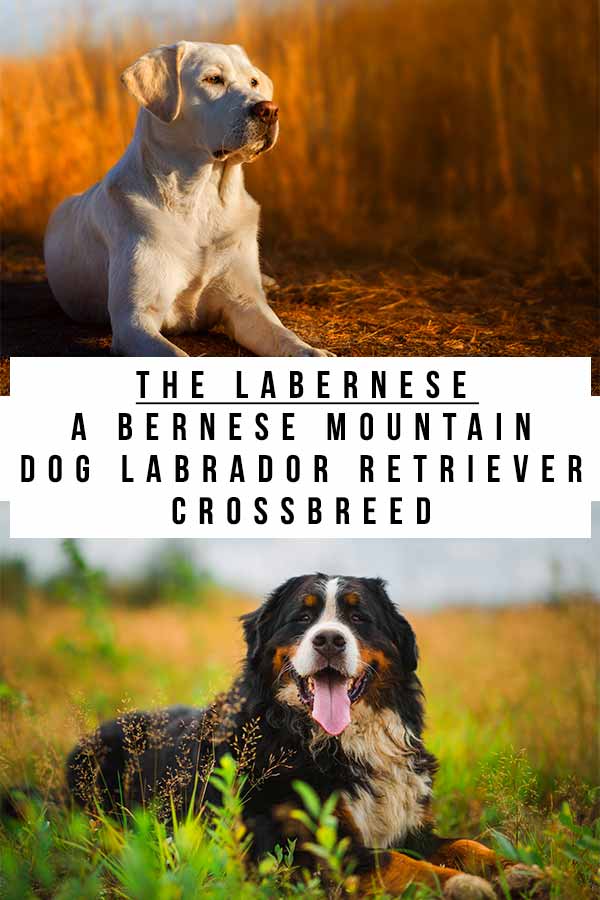
Labernese Appearance
It’s impossible to know for certain what any Bernese Mountain Dog Lab mix will look like exactly. But we can make informed guesses. Because of the respective sizes of the parent breeds, a Labernese dog could be anywhere from 21 to 28 inches tall at the withers. This depends on which breed the dog more heavily favors; a Lab is smaller than a Bernese, for instance. Female Labernese dogs will also tend to be smaller than males, as is usually the case regardless of breed.
Both parent breeds are well-built, sturdy, athletic dogs, so you can expect this of your Labernese. The weight could potentially range anywhere from 55 to over a hundred pounds. A Labernese is a larger dog with a strong, sturdily-built frame.
Coat Types and Grooming
The Labernese dog inherits a double coat from both parents, so you can definitely expect that. The fur will likely be moderately long, and may be quite soft and smooth.
Bernese Mountain Dogs have predominantly black coats, with white markings on the chest, muzzle, and feet, and rust markings on the face, legs, and chest. Labrador Retrievers can have yellow, chocolate, or black coats. Bernese Labs are often, but not always, bred with black Labs, so there may be more likelihood that you will find a black Labernese.
At the very least, Labrador Retrievers require brushing at least once a week, and more often during shedding season. The Bernese Mountain Dog needs about the same level of care, if not a bit more. So you can expect to brush your Bernese Lab mix once a week, at least. If she has a longer coat, more similar to her Bernese parent, she may also require a little detangling. For helpful tips on caring for Labernese dogs, click here.
Regular nail trims and ear and teeth cleaning keep any dog healthy and comfortable. Proper maintenance can also contribute to a longer life. Toothpaste that your dog enjoys the taste of will make the chore more pleasant for both of you.
Labernese Temperament
While it is certainly true that every dog has its own personality, there are behavioral traits common to each breed. Both Bernese Mountain Dogs and Labradors tend to be good-natured, so you can expect that from your mix.
Bernese Mountain Dogs can be standoffish with strangers and protective of their owners, as they were bred with guarding tendencies. With their families, they tend to be placid and loving. Labs are well known for their extroverted personalities, as well as being active, intelligent, and highly trainable.
The fact that both breeds are used as guide dogs and that the Mira Foundation of Canada specializes in the breeding of Labernese to serve the disabled is profound evidence of the crossbreed’s calm and trainable personality. Just remember that an individual Labernese may tend more toward the very outgoing, bouncy Labrador personality, or the slightly more reserved and calm Berner personality.
Labernese Socialization
Regardless of which parent breed a Bernese Mountain Dog Lab mix favors more, socialization is an important part of raising a well-behaved, happy adult dog. Both parent breeds tend towards friendliness, so socialization shouldn’t be a chore for them. Introduce them to different people, animals, and situations from an early age. That way, later on, newness won’t scare them or make them uncomfortable, and you can be confident in their ability to greet newcomers appropriately.
Training And Exercising Your Labernese
Labernese dogs combine the very active nature of the Lab with the slower-moving, more placid tendencies of the Berner. Your Labernese will thoroughly enjoy lots of exercise, and he will definitely require space to play in. Both parent breeds are highly trainable and smart. Start early to head off behavior concerns such as jumping and separation anxiety.
Studies show that positive reinforcement most often leads to optimum outcomes in your dog’s behavior and is more enjoyable for both of you than aversion training.
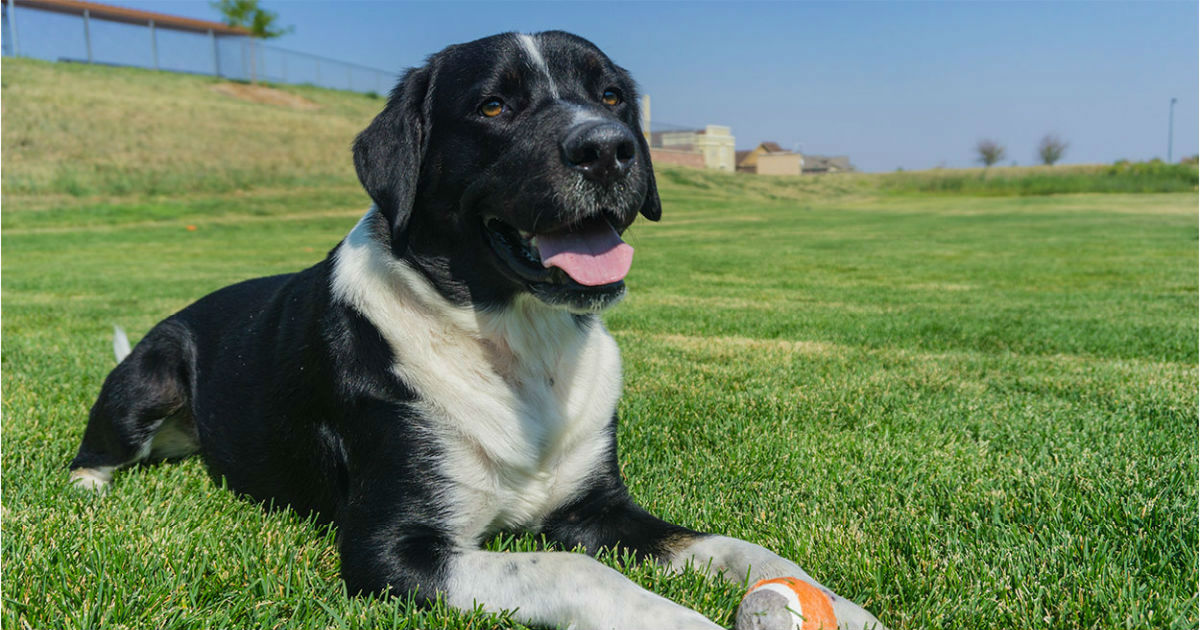
Be aware that using food used in training should come out of your dog’s daily total food allowance, so as not to add extra calories to their diet. Labs tend towards obesity. For more specific training, take a look at our articles on crate training and potty training.
Labernese Health And Care
Just as a mixed breed pup can inherit the appearance of either parent, she can also inherit the health concerns of either parent. In cases where both parents share the same common issues, it can be even more likely that their offspring will face those problems. On the other hand, mixed breed dogs like the Bernese Lab mix may see some benefit from mixed heritage.
It’s important to understand common health concerns for the parent breeds to also understand the possible implications of crossbreeding them. Ask the breeder for the scan results of the parents, especially for the conditions common to their breeds.
Labrador Health
The relatively common ailments of medium and large purebred dogs such as hip and elbow dysplasia and progressive retinal atrophy are known to afflict Labs and Berners alike. Stomach torsion, or bloat, is a potentially deadly risk for medium and large dogs that can be mitigated through proper feeding practices and management of exercise. Reading up on the causes of bloat and how to avoid or address it is a must.
Some diseases known to afflict Labradors and Bernese Mountain Dogs are recessive disorders, meaning that the dog must receive two copies of the mutated gene from its parents.
Centronuclear myopathy, a form of muscular dystrophy, occurs in Labradors when two carriers of the CNM gene are bred together. It is avoidable if testing is done prior to mating and detectable in litters if mating of untested parents has occurred. Exercise-induced collapse (EIC) is another recessive hereditary disease for Labradors but can be managed. Labs are also prone to obesity, ear problems, and skin allergies.
Bernese Mountain Dog Health
Bernese Mountain Dogs are also prone to hip and elbow dysplasia, which more frequently affects larger dog breeds. They also run a risk of PRA. Von Willebrand’s disease can afflict Bernese Mountain Dogs if they have received a copy of the mutated gene from each parent. Other potential issues that Berners face include neoplasia and degenerative joint disease.
Labernese Health
Because some issues are shared by both parent breeds, a Labernese runs a potentially higher risk for those problems. Utilizing all available health tests for the parents is the best way to avoid issues later down the line. For a Bernese Mountain Dog Lab mix, the following health tests are recommended:
- PRA
- hip and elbow dysplasia
- CNM
Labernese Life Expectancy
The average lifespan for a Labrador Retriever is 10-12 years. Bernese Mountain Dogs, as larger breeds, have a shorter span, of about 7-10 years. A Bernese Lab mix will fall somewhere within that range, depending on inherited health issues.
Labernese Shedding
Both parent breeds shed profusely, especially during shedding season. The thick double coat that the Labernese will inherit from both sides will only exacerbate the problem! However, with good grooming habits, the shedding can be kept more or less under control.
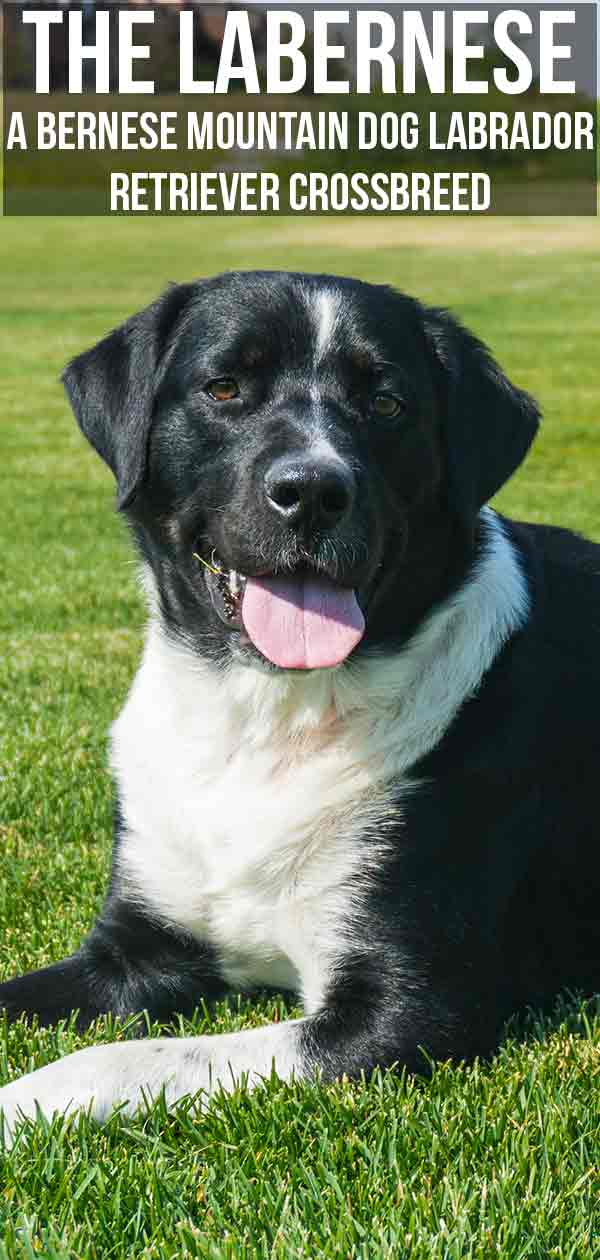
Shelter Dogs
Rescuing a young, adult, or senior dog is always encouraged, simply because giving a dog a second chance is one of the best things you can do for them! Getting to know an adult dog a little before you take them home will give you the chance to develop some insight into their personality.
Adopting an adult dog also takes a little of the guesswork out of adopting a mix.
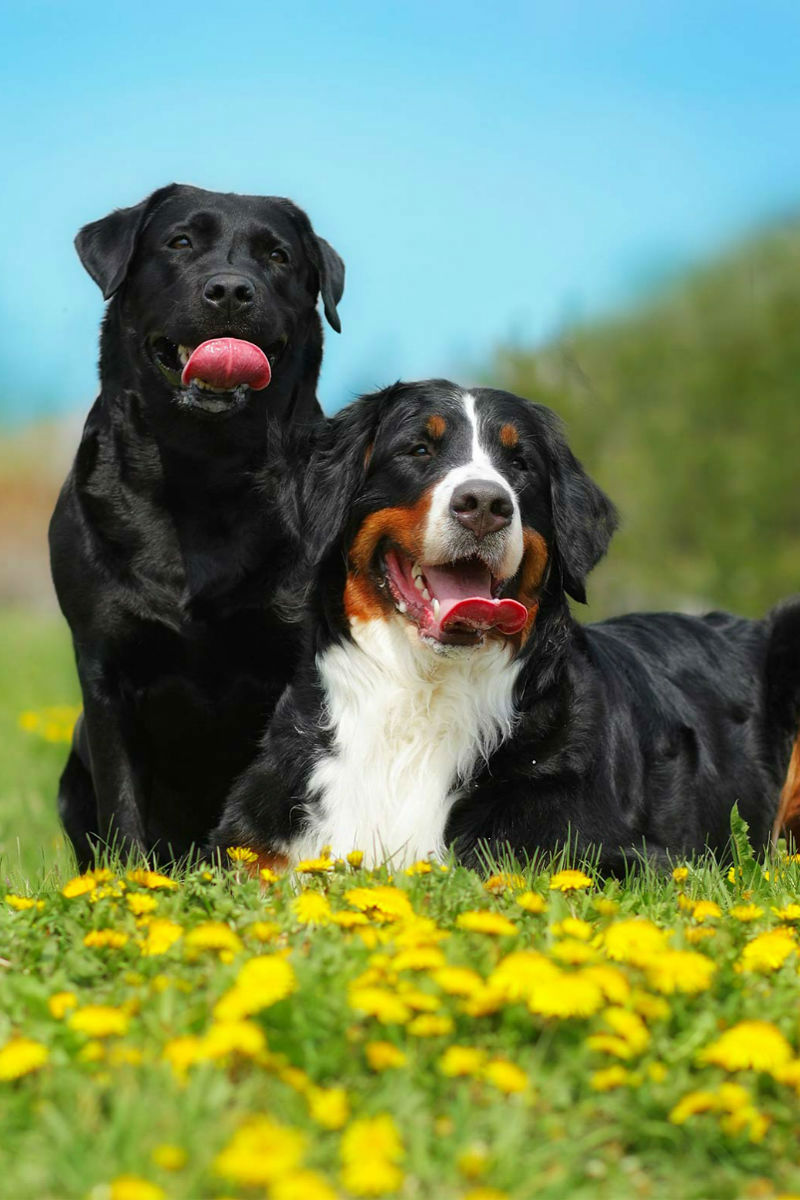
Finding A Labernese puppy
The Bernese Mountain Dog Lab mix isn’t a well-known mix, even though the parent breeds are so popular. Still, there may be breeders specializing in this mix in your area.
Make sure to vet the sources for the puppy you are considering. This is important so as to avoid puppy mills or unscrupulous “backyard breeders” who care more about making a profit than they do about the health of their dogs. Avoid any internet sites that offer to ship the dog to you! Breed clubs can be a reliable source of reputable breeders.
Breeders
Once you’ve located a breeder, don’t be shy about asking lots of questions, including requesting a list of references. Ensure the animals seem well-socialized and sound.
Pressure to reserve or buy a puppy should not be part of the transaction. Ask to review the health records of the parents, especially the scans for diseases Labs and BMDs are prone to contracting.
There is significant overlap in diseases and conditions that occur with some frequency in Bernese Mountain Dogs and Labrador Retrievers. The following tests for parents should be conducted and the results made available to you: OFA hips and elbows, cardiac and thyroid exams, and the OFA eye exams for progressive retinal atrophy (PRA). The Lab parent should be tested for CNM. The Bernese parent should be screened for Von Willebrand disease.
Pay close attention to the behavior and temperament of the dogs, and be sure to return for follow-up visits before your purchase. A caring, professional breeder will share your concern for making a good match and may require a contract for the dog’s return in the event things don’t work out as you’d hoped.
The Labrador Site Founder
Pippa Mattinson is the best selling author of The Happy Puppy Handbook, the Labrador Handbook, Choosing The Perfect Puppy, and Total Recall.
She is also the founder of the Gundog Trust and the Dogsnet Online Training Program
Pippa's online training courses were launched in 2019 and you can find the latest course dates on the Dogsnet website

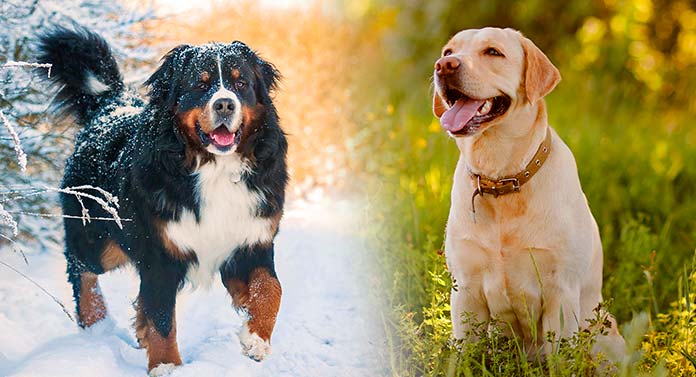


















Can i train my Labernese pup( 5months old) to Bird Hunt?
We love Lousy are 13 week old (today.) Mother was a Australian Sheppard/Labrador/Burmese. Her and are female Labrador/Sheppard/Collie, 7 years old are playing and getting along fine. The older one doesn’t even mind sharing her bedroom lol!
I have a Labernese and he is 2 years old .He is gentle and cannot give us enough love .Love him to bits. When we take him out and about people always pay him compliments. His coat shines and his tail wags all the time. He is a happy dog.
i got a 3 m old puppy 1.5 month ago from a farm. what a treasure. she definately acts as a puppy but is also quite smart. she loves company, so if i have to go to the office i either put her in doggy daycare or ask my friend who has a 6 year old german shepard and 12 year old rodie mix to watch her. it’s incredible how much she i slearning from the older dogs. after one day with them, she was coming to wake me up wiht licks and kisses not bits. amazing. she is very loving and super social. she knows her way around other dogs and is not easily intimidated but also knows how to show respect. what i need help with is how to curb her exitement towards strangers. she jumps up as she loves people and its really difficult for me to stop her. not only bc of her energy but also bc she is so happy to meet other people
I am looking for a Labrador retriever Bernese mountain dog mix. I had one for 15 years. He came from a farm in West Virginia and I paid $50 for Him. He was more than a dog but he defined an era in my life. I miss Him so much. I’m looking everywhere now to find another labernese. If anyone knows anything please contact me.
We have a 16 week old labernese puppy and she is the most trainable, gentle, loving dog. She barely even acts like a puppy. Highly recommend this amazing breed.
Hi do you know where we can find a lab Bernese mix?labeneaesp?